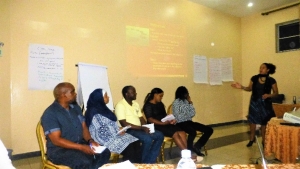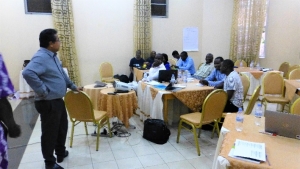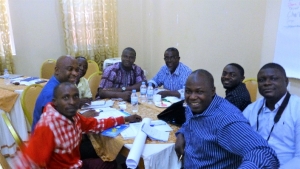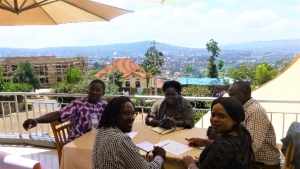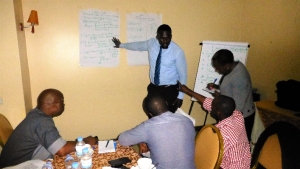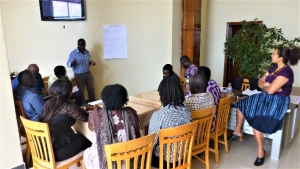News in 2017

|
FIG-GLTN Workshop
Strengthening Cooperation with Partners in the Global Land Tool
Network: Advocating and Implementing A Fit For Purpose Framework in the
Country Context
19-20 November 2017 Kigali, Rwanda
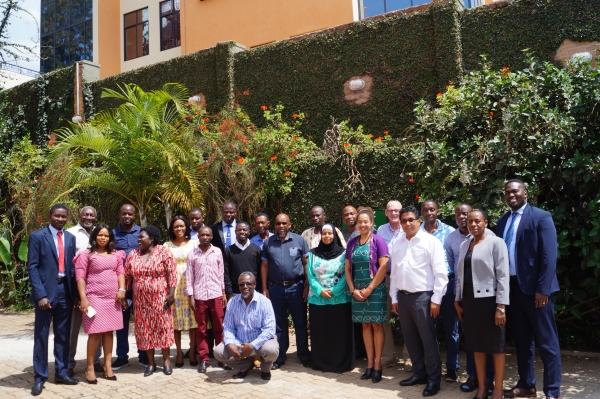
Group photo of Learning Exchange
Vice President Diane Dumashie headed up the GLTN Land Professionals
Cluster activity held in Kigali, Rwanda, 19-20 November 2017.
The activity, a learning exchange: Advocating and Implementing a
Fit-For-Purpose Framework in the Country Context: Delivering and
Determining the First Implementation Steps, was organised by FIG.
A highly successful event was designed and facilitated by Dr. Diane
Dumashie, Vice-President of FIG, and co facilitated by Prof Stig Enemark
with input by Danilo Antonio (GLTN). It attracted 25 participants
from 10 Sub-Sahara Africa countries drawing upon public and private
sector land professionals from the Africa Regional network, civic
society including slum dwellers international, FAO and several
ministries form across the African continent. The focus was to utilise a
two day learning exchange that was designed as a road map approach that
will enable participants to consider how to take the very first steps to
progress delivery of Fit-For-Purpose (FFP) land administration systems
in a country context. The event was co-hosted by GLTN, and will
contribute to the GLTN outreach strategy for FFP by serving as a
foundation template that may be replicated elsewhere.
The FFP approach to land administration offers a practical solution to
provide security of tenure for all and to enable effective management of
land use and natural resources. It provides a new, innovative and
pragmatic solution to land administration focused on developing
countries, where current land administration solutions are not effective
or not delivering at scale.
UN Habitat/ GLTN Fit For Purpose Guide
The FFP solutions provide frameworks to apply the spatial, legal and
institutional methodologies that are most fit for the purpose to provide
secure tenure for all by addressing implementation considerations in the
present day, yet allowing for incremental improvement of land
administration systems over time in the future.
The learning exchange objectives were to:
- Create a strong and
lasting understanding among participants of the FFP approach,
- Explore how to change
the status-quo, and
- Identify what a
learning exchange road map may look like
Participants from Public, Private, Academic and Civic
society hard at work
The participants were highly engaged and interactive in developing a
true understanding of how to take the FFP approach forward.
Key learning outcomes at the end of the Learning Exchange, witnessed the
participants concluding that the FFP approach
- Provides trust in
government through providing security of tenure
- Builds the future of
land professionals – especially in developing countries
- Serves people by
building a sustainable future.
Importantly, the format of the learning exchange is likely to work as a
template for future events aiming to promote the FFP concept and
engagements among land professionals. FIG and specifically the
Africa Regional network, looks forward to continue to engage with the
Global Land Tools Network.
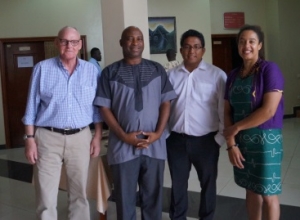
The facilitators, Stig Enemark, Danilo Antonio and Diane Dumashie
Following the FIG-GLTN Workshop the FIG Africa Regional Network
Meeting was held in Musanze, 22-24 November 2017. Report will follow.
Dr Diane Dumashie FRICS, Vice President FIG
December 2017

























